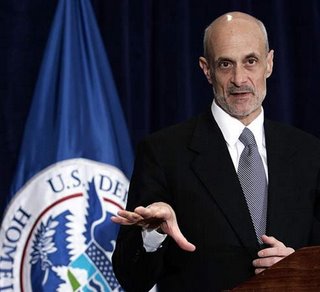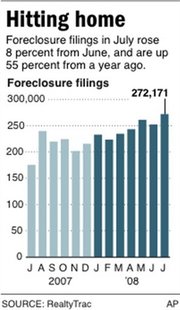Chertoff has recently cleared the way for the completion of nearly 500 miles of a planned barrier fence in California, Arizona, New Mexico and Texas.
________________________________________________________________________________________

JERUSALEM, May 29 (Reuters) – U.S. Homeland Security Secretary Michael Chertoff said on Thursday he will seek to adopt novel Israeli methods, like behaviour-detection technologies, to better secure America’s airports.
“That’s a scenario where Israel has a lot of experience,” Chertoff said in an interview with Reuters. “I think that it is of interest to us to see if there is any adaptation there.”
Israel’s Ben-Gurion International Airport, known for its strict security measures, relies heavily on techniques that detect suspicious behaviour among travellers.
Chertoff said such methods, as well as Israeli technologies that detect explosives, are some of the things that may help protect U.S. airports and other public places against attacks.
Chertoff, at a conference in Jerusalem for public and homeland security ministers from around the world, signed an agreement with Israel to share technology and information on methods to improve homeland security.
One of the new systems presented at the conference, developed by the Israeli technology company WeCU, uses behavioural science, together with biometric sensors, to detect sinister intentions among travellers.
The U.S. homeland security chief said that not all methods developed and used in Israel, such as questioning every passenger, are practical in larger U.S. airports.
Israel’s Ben Gurion handles about 9 million travellers a year while major U.S. hubs, like Chicago O’Hare, see some 76 million passengers.
“Not every technological approach here (in Israel) is necessarily applicable, but we are always open to look for technology from whatever source,” Chertoff said.
Chertoff also said that the U.S. could not adopt border security methods used in Israel, which prevent Palestinian militants from entering its territory, for U.S. efforts to stop illegal immigrants from crossing its frontier with Mexico.
“(It’s) a vastly longer border. It’s not an area where there is much useful experience,” he said.
Chertoff has recently cleared the way for the completion of nearly 500 miles of a planned barrier fence in California, Arizona, New Mexico and Texas.
“The challenge will be to keep moving forward. We need to continue to implement the measures we have in place and continue to look for additional things to match what the enemies are doing because they are constantly retooling themselves,” he said.
Chertoff is expected to leave his post when President George W. Bush finishes his term in January 2009. (Editing by Jon Boyle)
Thu May 29, 2008 4:03pm EDT
Source: Reuters



